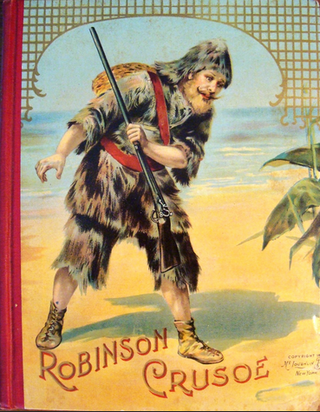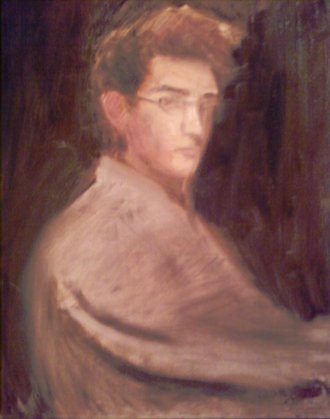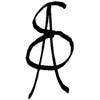How can a man living on an island alone impact my own artistic pursuit?  I recently finished reading Robinson Crusoe, the 1719 novel by Daniel Defoe and it left a big impact on me as a painter and reader. The story is based on a real man named Alexander Selkirk, who, in 1704, after arguing with his captain, was left (at his own request) on an island off the coast of Chile. He was rescued in 1709, and accounts of his struggles are what fueled Defoe to write his novel. I'm sure many of you have heard the tale, but if you haven't read it, put it on the list. But this isn't a book review, this is about how Robinson goes to an island with nothing and carves out a life for himself through mental and physical power. His struggle of course is an extreme case of isolation, but it is something that we all feel at some point throughout the artistic process. I have felt lost more times than I can count, almost to the point of giving up. Robinson admits himself that he is not fit to live on an island, but he says that realizing the truth about himself and his situation is what sets him free. He doesn't allow himself to become overwhelmed. At one point, Robinson is so frustrated with his own abilities to grow corn that he throws all his husks into a pile and gives up. After some time, he sees that the husks have sprouted into stalks, which he believes is an act of divine intervention. He plants a few rows of stalks and has a harvest that he can actually eat, but he decides that it is better to save the harvest and replant it again. The temptation of eating the first harvest is not worth it if he runs out of seed for next years harvest. The lesson is again applied when he realizes that he is running low on gun powder, which he needs for shooting fowl and goats. So he realizes that he is going to have to start a farm of goats, which he does and allows him to thrive on goat milk and meat. He "finds wealth all about him" because he played it smart and knew his situation. Realize your strengths and your shortcomings before you assess anything. And artistically speaking, it may not be a matter of life or death like Robinson, but it will effect your career choices and everyday life. It even enriches your life to realize that there is wealth all around you. The beauty of nature being the most powerful artistic wealth. One more word to the power of practice and working with a purpose- Robinson wants to build himself a desk at one point and only has a finite number of tools to do it with. So he builds a desk for writing, but it is not well made. But after years on the island, he becomes a very adept woodworker and builds a boat, a fortress and another desk for writing. He became a great craftsman out of necessity and hard work. He knows what he wants to build so he spends the years improving himself in order to build it. Put yourself in an island mentality for sometime and see if your skills improve.
0 Comments
What works for me, may not for you. Steeze is a term used in skateboarding referring to style + ease. It can't be taught, but only be improved by practice. Skateboarders all have a certain way of skating and landing tricks, and there isn't too much concern for copying anyone else style. It's all derived from experience, body type and how you like to skateboard. The same perspective isn't true of the art world. It's rather easy to fall under the spell of another artist. I fell under the spell of many artists and formed artistic crushes that taught me a large amount, while hindering me at the same time. This unfinished portrait to the left is a picture I took of my self portrait from 2011 as it was in progress. I would say this painting was full of my own steeze, which is why I love it to this day. I didn't particularly care about what colors I was using or technique. I was trying to paint a self portrait, plain and simple. I learned a great amount about techniques, mediums, and colors since I painted this when I was 19, but it is now time to hone my own steeze. I have been tip-toeing the line between imitation and finding my own path and it's impacting my work. I firmly believe that I will only create paintings that satisfy me when I walk my own way. But the hardest person to be often times is yourself. "It is better to fail in originality, than to succeed in imitation. He who has never failed somewhere, that man can not be great. Failure is the true test of greatness."- Herman Melville To act natural or train yourself? Is painting a natural process or expression. No doubt in my mind the answer is no. Trust me, I wish it were. But wishing never got me any where. The most "natural" of athletes, musicians, writers, or artists of any worth trained nonstop. I used to play a back and forth in my mind to either go with the flow or use reason and judgement. Here's how I think about it. We're all driving down a road. So the road sets the guide-lines of where to drive. And on this road, some may be driving faster than others. But if you are driving blindly and not using any judgement, you'll eventually crash. You have to know where you want to end up and also know how to get there. Your natural talent is a set of rules in a sense. Being able to surpass those rules requires persistent training. I read a lot about the "zone" that athletes find themselves in often during crucial moments and how it's a zen like meditative state. I remember the zone from when I used to play squash. The feeling that I could do no wrong. Now I fall into that state after being at the easel long enough, but it's not a lack of thinking that produces the effect. But rather, it's a deep state of thought where mind is ruling over body. There's a romantic notion that all great works of art were the result of the artist acting as a natural genius. The truth is not that. No one was ever brought up and automatically skilled at anything. Even prodigal geniuses like Mozart or Bobby Fischer reached their prime after years of commitment and having someone pushing them. So these great minds were built on a solid foundation of intelligence and commitment. After Fischer won the world chess championship in 1972, he was asked what he'll be doing now. His answer was that now he'll finally have more time to play chess. These stories excite me because I am looking to gain knowledge about my craft to put more tools in the toolbox through commitment. I can pull out some old paintings (before I used my colorblindness as a strength) and show you what I was trying to paint naturally. They are a blob of messy, muddy color in no particular order. So I learned the principles of technique because my natural state doesn't allow me to see subtle colors. Arm yourself with training and never be fooled into thinking that anyone is a natural talent. |
Archives
July 2024
Categories
All
|

 RSS Feed
RSS Feed